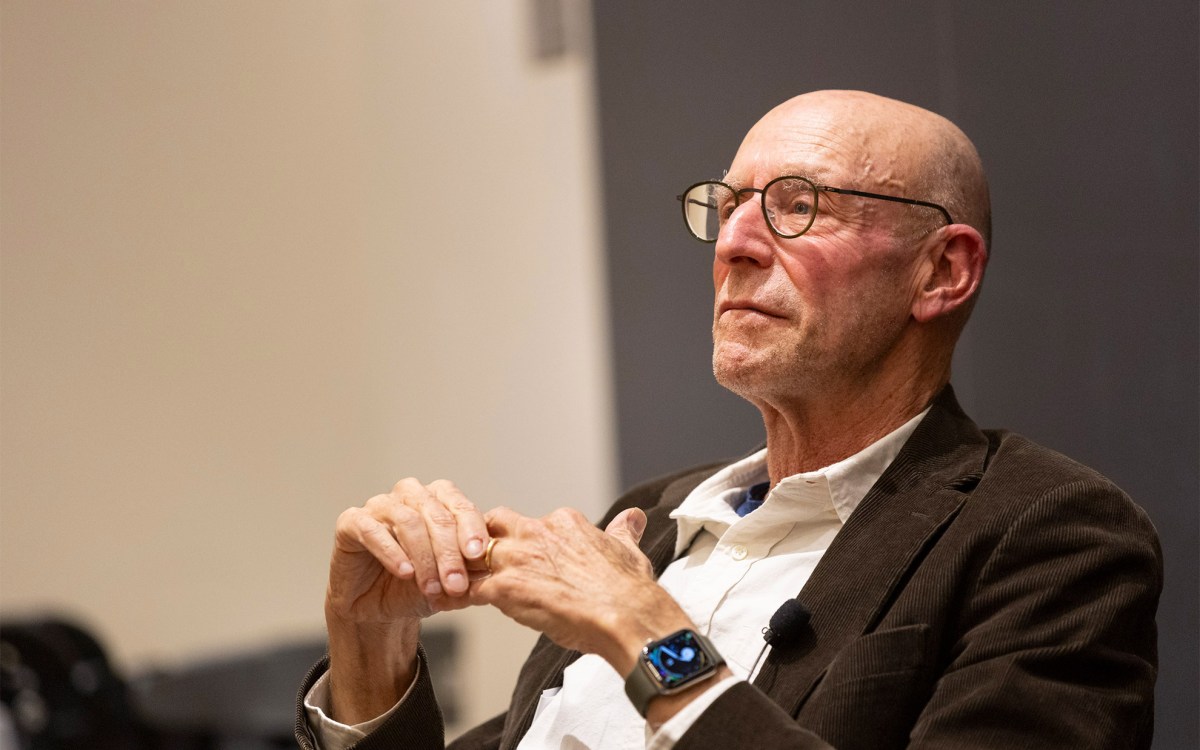Nieman Foundation Curator Bob Giles to retire
Bob Giles, curator of the Nieman Foundation for Journalism at Harvard for the past decade, will retire at the end of the academic year in June 2011.
“It is not easy to leave a great institution and the wonderful people who make it so, but this is a good time for my wife, Nancy, and me to begin a new chapter in our lives,” Giles, 77, said. “The Nieman program has grown significantly over the past decade and is sound financially. It continues to attract highly gifted, independent-minded journalists seeking a transformative experience at Harvard.
“For me, the privilege of serving as curator has been an extraordinarily rewarding period in a long life in journalism. It is time now for new leadership to build on what my colleagues and I have added to the program over the past decade,” Giles added.
As a newspaperman who cut his teeth in print journalism and worked as editor of newspapers in Detroit, Rochester and Akron during a career of more than 50 years, Giles has served as a mentor to midcareer fellows making their way in today’s exhilarating yet challenging work environment.
“Under Bob’s leadership, the Nieman Foundation has responded effectively to a rapidly changing media landscape by creating new programs that helped fellows and other practicing journalists understand their changing roles,” said Provost Steven E. Hyman, who will lead a national search for a new curator. “We are deeply grateful to Bob for his long and well appreciated service and for leaving the Nieman Foundation in a very strong position.”
Bill Wheatley, former executive vice president for NBC News and president of the Nieman Foundation Advisory Board, lauded Giles’ “superb contribution to the foundation’s vitality and reputation. During a period of great turbulence in journalism, he has positioned the Nieman Foundation for continued success in the years to come.”
Giles said that he and his wife, a psychologist, plan to stay in Cambridge, but eventually will move to Northern Michigan, where they have a home.
“My work with the fellows has deepened my desire to do what they do: take courses at Harvard, go to lectures and concerts, read,” he said. “I also can’t imagine not staying involved with journalism in some new way, especially now, when so much is possible and so much is at stake.”
While the program adjusted to the changing media environment under Giles’ leadership, it remained committed to in-depth, high-quality journalism and the foundation’s core mission of midcareer education. Giles also found ways to give the foundation a voice in the discussions about the future of professional journalism; promoted narrative journalism though Nieman programs; and introduced several new journalism awards that are presented by the Nieman Foundation each year.
Two years ago, the Nieman Foundation launched the Nieman Journalism Lab as a collaborative attempt to determine how high-quality journalism can survive and thrive in the Internet age. The Lab has a large following; it has attracted more than 2.4 million page views since its launch. The foundation’s quarterly magazine, Nieman Reports, expanded its reach online with the development of Professor’s Corner as a rich resource for journalism teachers and students. Nieman additionally supports websites on watchdog journalism and narrative nonfiction: Nieman Watchdog and Nieman Storyboard.
Soon after he arrived at Harvard in 2000, Giles saw the need to expand the Nieman Foundation’s headquarters, Walter Lippmann House, on the Harvard campus. In 2003, the expansion was completed, adding a seminar room, library and computer workspace for fellows. The new space enabled the foundation to become a gathering place for conferences and workshops on such pressing topics in journalism as the environment, pandemics, race, trauma, religion and human rights, education reporting, watchdog journalism and community journalism.
Giles has often spoken on the importance of protecting journalistic honesty and integrity as well as the importance to all democratic societies of investigative and watchdog reporting. He enabled international journalists who were threatened, jailed and sometimes beaten for doing their jobs in their home countries to find refuge in the Nieman program.
As publisher of Nieman Reports, Giles regularly writes a column titled “Curator’s Corner.” His writing has been published in The New York Times, The Boston Globe, Los Angeles Times and Daedalus, the magazine of the American Academy of Arts and Sciences. He also is author of a textbook, “Newsroom Management: A Guide to Theory and Practice,” which was published in 1987.
Giles was born in Cleveland and graduated from DePauw University and Columbia University’s Graduate School of Journalism. After service in the U.S. Army, he joined the staff of the Akron Beacon Journal as a reporter. During 17 years on the paper, he was an editorial writer, city editor, managing editor and executive editor. In 1970, he directed coverage of the campus shootings at nearby Kent State University during the Vietnam War, for which the newspaper won a Pulitzer Prize.
He left the Beacon Journal in 1975 and taught as a professional-in-residence at the School of Journalism at the University of Kansas. In 1977, he became executive editor and then editor of the Democrat & Chronicle and the Times-Union in Rochester, N.Y.
In 1986, he moved to The Detroit News, where he served first as executive editor and later as editor and publisher. This was a tumultuous period in Detroit journalism. The paper was honored for its journalism, including a Pulitzer Prize in 1994, but was faced with the challenges of a joint operating agreement with its rival, the Detroit Free Press, and a long, bitter strike that lasted for 19 months.
Giles retired from The Detroit News in 1997 and joined the Freedom Forum as a senior vice president and executive director of its Media Studies Center in New York City.
He is a past president of both the American Society of News Editors and the Associated Press Managing Editors association. Currently, he is a member of the ASNE Foundation Board and the board of directors of Harvard Magazine. He also has served eight times as a Pulitzer Prize juror. Giles was involved in journalism education, serving for six years as president of the Accrediting Council on Education in Journalism and Mass Communications.
Giles received an honorary doctorate in journalism from DePauw in 1996 and also won the Scripps Howard Foundation’s Distinguished Journalism Citation in 1978 for “outstanding public service in the cause of the First Amendment.”
Giles was a Nieman Fellow in 1966 and notes that the lessons learned in Harvard classrooms and the friendships of his Nieman classmates remain with him today.
He and his wife Nancy have three children and four grandchildren.




